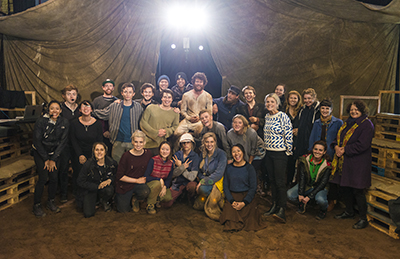Last month’s student production season provided an enviable opportunity for some of our Bachelor of Fine Arts (BFA) and Master of Fine Arts (MFA) students to work with distinguished Icelandic theatre director Prof Egill Heiðar Anton Pálsson.

Last month’s student production season provided an enviable opportunity for some of our Bachelor of Fine Arts (BFA) and Master of Fine Arts (MFA) students to work with distinguished Icelandic theatre director Prof Egill Heiðar Anton Pálsson.
Pálsson’s impressive theatre career has seen him stage performances at the National Theatre of Iceland and at the city theatres of Gothenburg, Stockholm and Uppsala and the Royal Theatre in Copenhagen. In 2009, he staged John Cassavetes’ Husbands at the National Theatre Mannheim, where he also premiered his production of Tracy Lett’s Bug in 2010. Furthermore, he’s worked at the Schaubühne � Theater Berlin, as well as on the world premiere of Dostojevkys Notes from the Underground.
For the production at NIDA, Pálsson staged Berthold Brecht’s The Caucasian Chalk Circle, which featured over 30 NIDA BFA and MFA students from almost every discipline.
‘I selected that particular play because of something that happened last summer in Berlin. After leaving my house and walking down the street, I came across a couple with two children. They asked me for help as they had just walked from Syria. As a father of two, this was really confronting,’ said Pálsson.
From that encounter, the seed for his time at NIDA was planted. The Caucasian Chalk Circle would subsequently offer a means for Egill to highlight the refugee crisis, the repercussions of which he had experienced firsthand.
The play centres on war in the feudalism era and the hardships faced by the main protagonist when she tries to find refuge from not only the war, but poverty, suffering and class discrimination � a play bearing stark similarities to the issues of modern day.
‘Egill’s vision was to educate the audience on slightly darker things. Despite its feudalism era setting, the play had real relevance to today,’ said second year BFA (Acting) student, Heidi Doran, who played two characters in the production.
The opening of the play featured a heated discussion between the actors about the current global refugee crisis. This helped the audience engage with the content that was to come � relating it to modern day � and also enabled Egill to bring the actors into his own vision for highlighting the refugee crisis through his art.
‘Our Assistant Director Warwick Doddrell asked the actors to make a new prologue for the play. They did this by researching the refugee crisis and finding statements made by Australian politicians and news outlets,’ commented Pálsson.
‘The research we did was eye-opening and made us want to tell the story to a greater extent. It also brought us into Egill’s vision for the production. Everything that we had learned from our research, we wanted other people to know, so they could take away a better perspective,’ said Doran.
‘We formed both negative and positive opinions based on our own research to produce a comprehensive debate, which we rehearsed and staged as improvisation,’ added second year BFA (Acting) student Alexander White, who played three characters in The Caucasian Chalk Circle.
NIDA students started working with Pálsson in September 2016, when he would hold twice-weekly Skype sessions with MFA (Design for Performance) students Maya Cranny and Nagham Helou, who were responsible for Costume and Puppet Design and Set and Properties Design, respectively, and BFA (Technical Theatre and Stage Management) third year student, Emeline Sandt, who was the lighting designer.
‘That part of the process was very professional as well as educational without being pedagogical. Of course, it was artistic, which I believe is the most important kind of process to achieve during training,’ said Pálsson.
Pálsson’s professionalism and vast experience came through during his work with the students, and they really felt that they were working with a special director.
‘He was great at taking our ideas, characters and suggestions while staying true to his own vision, which was very clear in his head. He was very good at keeping control and making sure it was the optimal collaborative space, and didn’t once need to step into the shoes of an authoritative director. That’s where his experience really came into play. He found the simplest yet most precise ways of getting what he wanted out of us.
‘He encouraged us to find three-dimensional characters. Not characters that are internal and consumed by their own mind, but characters that can impact and actively engage with the external and the other actors’ space,’ said White
Guest directors are able to instill their real-world experience on our students when they come into NIDA to direct student productions, and they treat them very much like professionals despite the fact that they are still in their training.
‘Working with Egill reminded us that, as actors, we are here to tell a story � something you can sometimes forget when training. Bringing people in from the real industry helps you reconnect with the most important principles of your craft, and it provides a safe, professional space to do it all in.
‘He’d sit us down and have long chats to debrief us all on everything we’d done and learned. Without even realising it, we’d discover that we’d learned so much. For instance, we’d have been using certain theories and linking them together with our performance, and we’d been subconsciously playing a super objective within the narrative,’ commented Doran.
‘Having Egill as a director was like a fantastic preview to what I hope my career will be like. I hope to work with people like Egill my whole life,’ said White.
Pálsson’s own thoughts seemed to mirror those of the students � admiration for the people who he had worked with on the June production.
‘Students of all disciplines at NIDA have a very high level of professional education. Bringing such a big production together in terms of set, text and complicated changes and over 70 costumes was no easy task. But they managed to do that and more.
‘I am very proud of the work that went into making the production a success and was really impressed as a theatre practitioner. I thank each and every one of the NIDA students involved in this production. From students and tutors, to the technicians and builders, and the administration and leadership � it was a tour de force and a lovely one,’finished Pálsson.
Our June production season is one of two such events in the academic year where students work on fully formed productions for public performance. Find out more about our BFA and MFA courses at our upcoming Info Night, more details are available here.
Applications are now open for our 2018 intake, find out more here.

